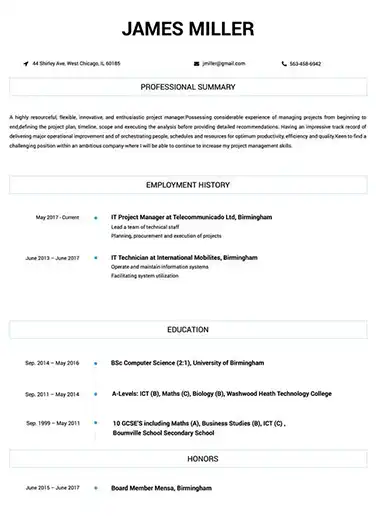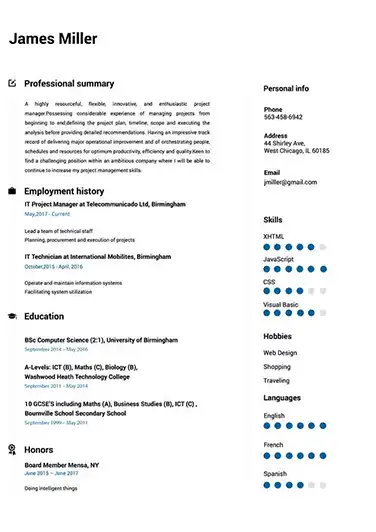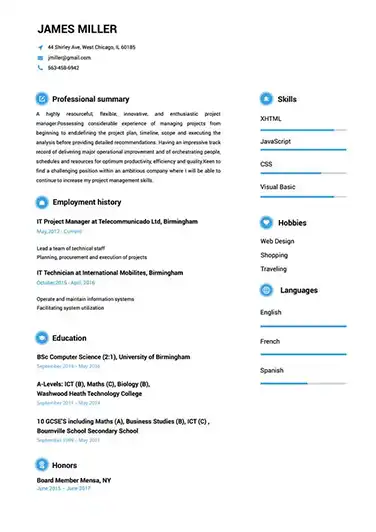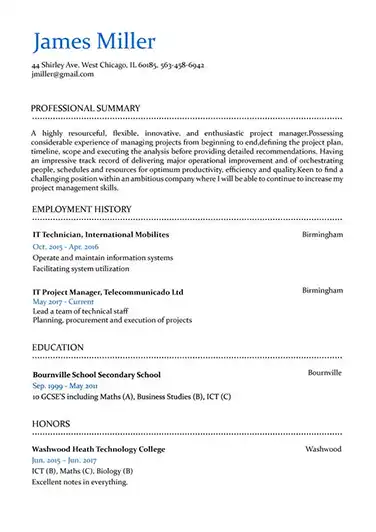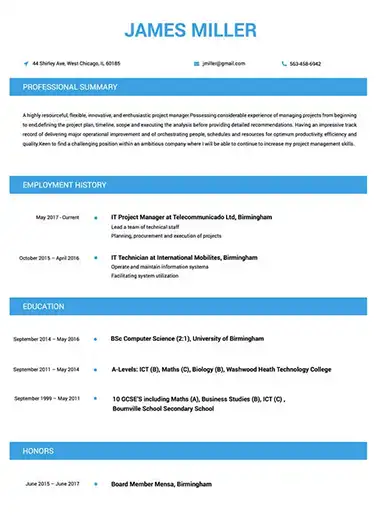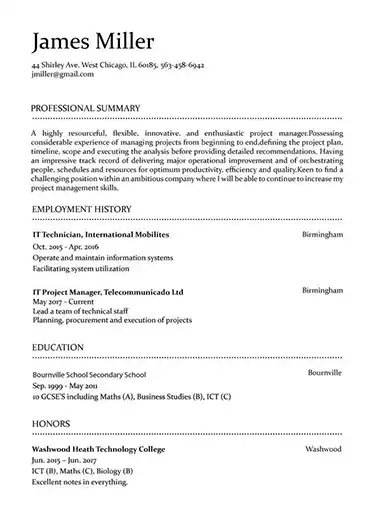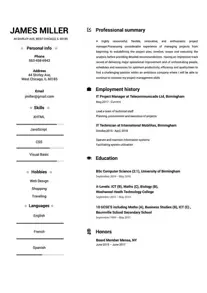 Use This Template
Use This Template
Build your resume in 15 minutes
Create an awesome resume that meets the expectations of potential employers with our selection of professional, field-tested resume templates.
technical writer: Resume Samples & Writing Guide
Technical writers, often called technical communicators, are considered to be a fundamental part of many workplaces due to the unique role they play in supporting key stakeholders to comprehend complex technical information. According to the Society for Technical Communication, the value that technical writers deliver is two-fold:
- They make information more useable and accessible to those who need that information.
- They advance the goals of the companies or organizations that employ them by doing so.
Many people mistakenly believe that technical writers only write instructional manuals for the tech industry. However, they may need to engage in any number of tasks that serve to communicate information more clearly to customers and/or clients. For example, technical writers may need to create relevant diagrams, compile how-to guides, and write journal articles for applications, services, procedures, and/or regulations. What’s more, tech writing jobs are not limited to the tech industry – the science and medical industries also hire tech writers in droves.
Considering all of this, it’s not surprising that the Bureau of Labor Statistics (BLS) projects that employment of these professionals will grow 8 percent from 2018 to 2028. This is double the projected growth of media and communications workers and 3 percentage points higher than the average of all occupations. The BLS notes that this demand for technical writers is primarily driven by, “The continuing expansion of scientific and technical products and growth in Web-based product support.”
If you’re a technical writer who wants to ride the wave of job growth in the sector, don’t make the mistake of applying for jobs with a mediocre resume. In order to get hired for your dream job, it’s critical to apply with a technical writer resume that recruiters pay attention to.
For those of you who are unsure of where to begin, just consult our easy-to-read technical writer resume writing guide below. You’ll discover:
- The correct way to format and layout your resume
- Which types of skills you should emphasize
- Insider tips for drawing attention to your achievements
- Best practices for writing your resume objective or summary
- A quick and easy method of creating a stunning resume
1. Multiple Template Examples
2. How Do You Create a Technical Writer Resume That Will Land the Job?
How should you format your resume?
The very first step you’ll need to take on your resume writing journey is to decide on which resume format to use. There are a couple of go-to formats to choose from that have been designed to suit different circumstances.
We strongly recommend that experienced technical writers use a reverse-chronological format. This format isn’t only our top pick; it’s also the preference of most recruiters. It’s therefore no wonder that it’s become the most popular resume format around! The good news is that implementing it only requires you to do two main things:
- Position your “Employment History” front and center in your resume.
- Arrange your work experiences in reverse-chronological order i.e. from most recent to least recent.
Easy, right? Now that we’ve dealt with the matter of formatting your resume, let’s move on to its layout. There are a handful of unwritten rules you’ll need to follow in order to align your resume with recruiters’ expectations. We’ve included the most pertinent ones below for your convenience:
- Number of Pages: 1 page at most.
- Fonts to Use: A font that reflects your expertise and professionalism, such as Garamond and Cambria.
- Fonts to Avoid: Any fonts that you wouldn’t dream of using to write a technical manual, such as Acme Secret Agent and Geek a Byte.
- Margins: 1 inch on all sides.
- Line Spacing: 1 or 1.15.
- Header size: 14-16 point size.
- Text size: 11-12 point size.
Just like your resume formatting, these aren’t difficult to follow. The only challenge you may encounter is in ensuring that you apply these rules consistently throughout your resume.
Pro tip: If you’d rather put all your effort into actually writing your resume and not waste time on perfecting its format and layout, consider using a premade resume template. Resume templates come complete with all of these considerations worked out for you. And just in case you’re wondering, it isn’t considered taboo to use a resume template – in fact, they’re used by countless job seekers!
How do you list your education on the resume?
Most technical writer positions require candidates to hold a college degree. Ideally, the degree should have direct relevance to the field of technical writing. For example, most recruiters would look favorably on candidates with the following degrees:
- Science
- Engineering
- Technology
- Writing
- Journalism
- Technical communications
Even if your college degree is unrelated in any way to technical writing, it’s important to feature it in your resume. Recruiters tend to prefer technical writers with college degrees, regardless of what that degree is.
So what should you do if you didn’t go to college? Simply include your high school diploma instead.
In order to feature your degree or diploma in your resume, you’ll need to first create a separate “Education” section. Before you start fleshing it out, keep in mind that lengthy descriptions about your educational background are frowned upon. To see what we mean, take a look at the following example:
EDUCATION
- In an effort to graduate from college with a degree that would benefit me as a future technical writer, I studied electrical engineering at the University of Virginia. In my 4 years at college, I developed my knowledge of physical and mathematics as well as my understanding of electrical systems. I proudly graduated in 2019.
While you may assume a recruiter is expecting this level of detail, you couldn’t be further from the truth. When recruiters look at your “Education” section, they only want to see hard and fast details about your educational background. That’s why you should only list key details about each degree or diploma, as follows:
- The name of the degree or diploma
- The name of the college or school
- The state the institution is located in
- The years you studied it
Putting this into action, the candidate above should rewrite their “Education” section so it looks like this:
EDUCATION
Bachelor of Electrical Engineering, University of Virginia, VA, 2015 - 2019
What are the differences between hard and soft skills?
In order to perform your job well as a technical writer, you need to constantly draw on the range of useful skills you have at your disposal. These skills can be respectively categorized into two types: hard skills and soft skills.
Hard skills encompass any teachable abilities that are easily measurable. Hard skills are often referred to as technical skills as they require a certain level of expertise to perform. They are often specific to a given job and usually need to be developed through training and/or on-the-job experience.
In contrast, soft skills are interpersonal abilities that are often innate to each individual. They are difficult to measure in a quantifiable way given their intangible nature. Soft skills will present themselves in both how you interact with others as well as how you perform a given task.
To give you a taste of which hard and soft skills recruiters may be looking for from candidates for technical writer jobs, we looked through several real-life job ads to identify the most commonly-requested skills. Take a look at our lists below to see which ones you may be expected to include in your own resume:
Hard skills
- Designing, writing, and editing technical and process documentation
- Improving existing documentation, both technically and aesthetically
- Thorough knowledge of the fundamentals of writing, grammar, syntax, style, and punctuation
- Ability to write in adherence to appropriate editorial styles and publication guidelines
- Thorough research and fact verification skills
- Writing clear, lively, engaging and compelling copy in a variety of styles appropriate to target audiences
- Performing quality reviews of documents created/updated by colleagues
- Reviewing and managing externally 3rd party produced documents
- Ability to work with internal and external customers and suppliers to obtain information
- Contributing and editing technical parts of customer communications
Soft skills
- Attention to detail
- Active listening
- Collaboration skills
- Self-motivated
- Team player
- Prioritization abilities
- Ability to multitask
- Time management
- Positive attitude
- Ability to remain calm under pressure
Which skills should you put on a technical writer resume?
Now that you’re clearer about the differences between hard and soft skills, you may be wondering which specific ones you should put in your technical writer resume. We hate to break it to you, but there isn’t a golden list of hard and soft skills that you can simply copy and paste each time you apply for a new job.
This is because while many of the skills recruiters desire from candidates will be similar in nature, they will nevertheless differ from job to job. By implication, in order to show that you possess the specific skill set needed for a specific job, you’ll need to feature a distinct set of skills in each and every resume you hand in.
To be clear, this doesn’t mean that you should feature a hodgepodge of skills in your resume. You must select relevant skills that a recruiter is specifically looking for. To figure out what these skills are, scan the job ad of the role you wish to apply for and create a list of the hard and soft skills which you find in it.
Once you have your list, go through it and ask yourself, “Which of these skills can I genuinely offer?” Needless to say, the more you can offer, the better. However, keep in mind that you don’t need to offer every single skill you find in order to impress a recruiter.
After all, it also matters how you include these skills in your resume. Essentially, you should list 6 to 8 of your top ones in a dedicated “Skills” section. You should also highlight a few in your “Resume Objective” or “Resume Summary.” Finally, and perhaps most importantly, you should demonstrate how you’ve put these skills into practice by incorporating them throughout your “Employment History” section. We’ll teach you how to do this in the following section.
Pro tip: Even if a job ad doesn’t mention any soft skills, be sure to include the ones you feel confident with offering throughout your resume. Recruiters want candidates who are balanced and offer both useful technical and people skills. Plus, there isn’t a recruiter out there who wouldn’t be impressed by a candidate who shows their initiative like this!
How to highlight your achievements
Your “Employment History” section is one of the most critical sections in your entire resume. It’s your opportunity to make it known to the recruiter not only where you previously worked and what roles you held, but also what you achieved during each of them.
Note how we just wrote ‘achieved’ rather than ‘did’. Simply listing the duties you performed in each role is a rookie mistake. You need to put a spotlight on your key achievements so that a recruiter can see the immense value you’ll bring as an employee.
So which achievements should you highlight? Any that are directly relevant to the role you’re applying for. To pinpoint the most relevant ones to include, take a careful look at the job ad of the role. As we explained in the previous section, you’ll be able to identify a range of hard and soft skills a recruiter is after from their ideal candidate. You should also take note of any other words that indicate the qualities a recruiter values in an ideal candidate. These can all form the basis of the achievements you include.
Wondering how this looks in action? Let’s run through an example together. Say that you’re analyzing a job ad and pick up on the fact that a recruiter is after a technical writer who is able to ‘collaborate’ well. Now that you know one of the many skills and qualities a recruiter is actively looking for, you can set out to target it in your “Employment History” section.
To do so, reflect on your professional experiences thus far and pinpoint an example of when you demonstrated your ability to collaborate at work. Then, formulate an achievement that eloquently shows this in action. In the end, it may look something like this:
- Collaborated with a team of 5 other technical writers to produce a 100+ page manual for a multi-million dollar product.
How impressive does that sound? Not only would you show the recruiter that you hold the very quality they’re after, but you would also be able to highlight your achievement of producing an extensive manual for a critical product. Not too shabby, right?
How do you write a resume objective or summary? When should you write which?
As a technical writer, you’ll know that it’s best practice to first provide an overview of what a given product is before providing an explanation of how to use it. You should ensure you apply this same rule of thumb when writing your resume.
That is, you should first provide a recruiter with a general overview of who you are as a professional before launching into specific details about your employment history, skills, and so on. The reason we recommend doing so is because recruiters usually want to first see if it’s worth their while to read through your resume more extensively.
For this reason, it’s crucial to include a resume objective or resume summary section right underneath your contact details. Including one gives you the opportunity to immediately capture a recruiter’s attention in 3 to 4 sentences. You can learn more about each one below, including when you should use which.
Resume objective
Anyone who’s starting out as a technical writer should ensure they include a resume objective in their resume. It’s the perfect excuse to subtly address the fact that while you’re inexperienced, you nevertheless have a lot to offer.
When you’re writing yours, there are certain pitfalls you’ll need to be conscious to avoid. We’ve represented the most critical ones in the following example of a technical writer resume objective:
- Aspiring technical writer looking to get a break in the industry. Very talented writer with some technical background. While I haven’t worked in the industry yet, I know that once I have received professional training and guidance from TEK Electronics, I will be well on my way to being a star technical writer.
As you may have noticed yourself, this candidate hasn’t said very much at all. While they’ve managed to write over 50 words, they don’t provide any substantial insight into what they believe they offer as an aspiring technical writer. The candidate has spent their entire resume objective stating that: a) they’re unqualified b) they’re keen to enter the industry, and c) they’re looking forward to receiving training and guidance from the company.
A recruiter wouldn’t be impressed by this at all. It’s absolutely fine to show your eagerness for a role, but keep in mind that your resume objective should primarily focus on what you plan to bring to the company (and not what the company can give you). Moreover, you should try to de-emphasize the fact that you’re inexperienced by showcasing the most relevant attributes you have to offer that make up for this inexperience.
So how should a resume objective look like? The following example represents a neat and well-written one:
- Aspiring technical writer who graduated in the top 5% of a Mass Communications program at Glendale Community College. In an effort to further my technical writing skills and knowledge, I recently completed a Communicaid Technical Writing Course. While I am currently volunteering as a technical writer on an open source project, I ultimately wish to apply my ability to write detailed technical how-to guides and my time management skills to the role at TEK Electronics.
We think you’ll agree that this resume objective is considerably more enticing than the previous one. This candidate has focused all of their efforts on putting their best foot forward. They’ve exclusively featured relevant tidbits about themselves that a recruiter would be genuinely interested to learn more about.
It’s worth noting that similar to the previous candidate, this candidate is inexperienced. However, this candidate focuses on what they have to offer – and not on what they don’t! For example, they shared their impressive educational background, the writing course they undertook, their current volunteer work, as well as their hard and soft skills...all without explicitly mentioning the fact that they’re inexperienced.
As all of these eye-catching offerings are directly relevant to the job they’re applying for, you can bet that a recruiter would greatly anticipate reading the rest of their resume. If you want to ensure your resume objective also ticks all the right boxes, be sure to keep these dos and don’ts in mind.
Resume summary
You should swap from a resume objective to a resume summary once you have at least a few years of experience under your belt. The main difference between a resume objective and a resume summary is that you should draw strong attention to your professional experiences in your resume summary.
You should also make sure to highlight any other information that’s relevant to the role, such as the skills and attributes you offer. To do this correctly, make sure to avoid writing in an ambiguous way, like this candidate did:
- Technical writer with 6 years of experience. Worked for a range of companies completing various technical writing tasks. With an impressive skill set and great attitude, I am fully confident that I will be an asset to your team of technical writers at XY Solutions.
The problem with the ambiguousness of this candidate’s resume summary is that it keeps the recruiter at an arm’s length. For example, this candidate says they have “4 years of experience” at “a range of companies.” This doesn’t provide the recruiter with any indication about what the candidate’s experiences entailed or the nature of the companies they worked at.
The candidate goes on to say they completed “various technical writing tasks” and have an “impressive skill set” and a “great attitude.” Again, this doesn’t shed any light on who the candidate is as a professional. Remember, the whole point of a resume summary is to showcase your best assets, but you can’t do so if you don’t provide any specific details about your professional experiences, skills, and attributes.
The following candidate shows how a resume summary should be written:
- In my 6 years of working as a CPTC Expert Certified technical writer in both a tech startup and Fortune 500 company, I have leveraged my superior grammar skills and meticulous attention to detail to create 500+ technical documents and improve a further 200+ for clarity and comprehension. My key achievement was creating the technical manual for a product that won a CES Innovation Award in 2019.
What a breath of fresh air this resume summary is! It’s filled with specific details that paint the candidate as a highly competent professional. While both candidates offer the same level of experience, only this candidate gives the recruiter a multitude of reasons to take their application seriously. They achieve this by not being shy to justify why they’re worth paying attention to. They not only share the types of workplaces they’ve worked in and the fact that they’re a certified technical writer, but also their notable hard and soft skills.
Did you notice that the candidate also quantified their achievements by highlighting eye-catching metrics about the number of technical documents they created and revised? As if this wasn’t enough, the candidate even ends with a specific key achievement to ensure their resume stays on the recruiter’s mind long after they’ve finished reading it.
These are all things you can do in your own resume summary – you just need to make the effort to do so!
How do you write a technical writer resume when you have little or no experience?
Many entry-level job seekers have been stumped by the age-old conundrum of how to get a job if you have minimal or zero experience. With many jobs listing experience as a prerequisite, it can seem futile to score a job as an entry-level candidate.
If this is the case for you, remember that it all comes down to how you write your resume. Need some expert advice for doing so? Follow our top tips below:
- Highlight your most relevant attributes: A common mistake entry-level candidates make is that they end up including just about every detail possible about themselves in their resume. This often happens because they’re so self-conscious about their lack of skills and experience that they try to overcompensate by providing too much information.
The key to writing an eye-catching entry-level resume is to keep it tight and focused. You should primarily hone in on the most relevant attributes you offer. If you find that these are lacking, try your best to make those that you have as relevant to as possible to the given job. For example, you can highlight the strong organizational skills you demonstrated as a waitress, or the communication skills required at your call center job.
- Search for jobs suitable to your experience level: Are you finding it all but impossible to make any tangible links between your attributes and those required by the jobs you’re applying for? The problem could be that you’re applying for jobs that exceed your experience level.
Instead, you should actively apply for jobs that match your experience level i.e. entry-level jobs. Once you start doing so, you’ll find it far easier to create a resume that ticks the boxes a recruiter is after. To track down entry-level jobs, use relevant search terms such as “Junior” and “Entry-level.”
- Pinpoint and address what you’re lacking: Most recruiters are willing to take a chance on hiring an entry-level candidate if they can clearly see their potential. This is why you can’t simply proclaim that you’ve always dreamed of being a technical writer and hope this gets you hired; you need to offer a range of solid reasons why you’re worth hiring.
To do so, you’ll need to determine if you’re able to provide the qualities a recruiter is after. If you discover that you’re lacking something, figure out a practical way to gain it. For example, if you’re lacking certain skills, consider taking up a relevant course or certification to hone them. If you’re struggling to gain experience, consider applying for a technical writing internship.
How to make your resume stand out
You may have already been cautioned about the importance of making your resume stand out, but just how important is it really? Well, consider the fact that for every job you go for, there could be several hundreds of other candidates who also submit their resume.
On one hand, many of these resumes will be uninspiring, but on the other, many will be precisely what the recruiter is after. That means that in order for your resume to be counted among the latter group, it will need to be better than just ‘ok.’ What’s more, to come out on top, it needs to truly stand out even among the best of the best. If you’re ready to do so, take on board the following tips:
- Highlight your relevant training and certifications: If there’s one surefire way to impress recruiters, it’s by providing evidence that you’ve gone above and beyond to progress your skills and knowledge as a technical writer. You can do this by including a strong “Training and Certifications” section that showcases relevant technical writing training and certifications that you’ve completed.
For each one, include its name, the institution you completed it at, the state in which the institution is located, and the year you completed it. If you don’t have any, consider undertaking some to ensure that this section truly shines. If you can’t attend any in-person, there are plenty of online options available that you can complete at home.
- Be aware of the ATS: We’ve already armed yourself with the knowledge of how to get on the good side of recruiters. However, recruiters are just one part of the story. You’ll also need to ensure your resume is ATS-friendly. ATS, which stands for ‘Applicant Tracking System,’ is a computer program that recruiters use to efficiently vet candidates’ resumes. It methodically scans each resume to identify whether or not it includes specific words found in a given job ad.
These words are called ‘keywords.’ They represent the attributes a recruiter is seeking from an ideal candidate such as specific skills, qualities, job titles, and professional experiences. Getting your resume past the ATS will require you to incorporate any keywords that apply to you naturally throughout your entire resume. If you need a reminder how to do this, re-read the sections about “Skills” and “Achievements” above.
- Create an online portfolio: Your resume can only convey so much about your skills and techniques as a technical writer. So why not show a recruiter that you have what it takes by including a link to your online portfolio in your resume? While there’s no guarantee they’ll click on it, it’s highly likely that a good proportion will!
If you don’t already have an online portfolio, you can put a basic one together in just a couple of hours. To begin, you’ll need to register a domain name. We recommend selecting a logical one like yourname.com. You may also wish to buy a website template to expedite the entire process. To compile your portfolio, add any links you have to your work and/or screenshots. It’s also worth adding a professional bio and your contact information. Who knows, you may even score a few jobs directly from it!
3. How You Can Create a Stunning Technical Writer Resume Using Resumebuild.com’s Resume Builder
Most writers can attest to the fact that writing about yourself in an eloquent manner is an incredibly challenging task. Even the most prized writers may struggle to string together the right combination of words to properly convey who they are as a person and professional.
So if you’re a technical writer who’s struggling to piece together your resume, take comfort in the fact that you’re not alone. While many would assume that writers of all people would excel in resume writing, this simply isn’t always the case – especially for technical writers. After all, out of the various types of writing professions out there, technical writing is literally on the opposite end of the spectrum than resume writing!
Does this mean that you’re doomed to hand in a half-baked resume if you’re struggling to write yours? Definitely not! It just means that you’re in a similar boat to countless other job seekers. You simply need a bit of expert guidance by way of our DIY resume maker at Resumebuild.com.
Thousands of job seekers have already used it to get their resume looking sharp and ready to impress even the most nit-picky of recruiters. The reason our resume maker beats alternative resume making approaches is because it provides a quick, easy, and cost-effective means of doing so.
It is designed to remove the confusion out of the resume making process by breaking it down into easy-to-manage steps. Each step gives you the guidance you need to expertly piece together each fundamental section of your resume. You’ll even find a generous number of pre-written examples as well as an assortment of well-formatted resume templates to choose from.
Once you’ve completed all of the steps, you’ll have yourself a technical writer resume that blows the competition out of the water. Did we mention that you can get through all of these steps in just minutes if you’re really in a rush? If you’re ready to take our resume builder for a spin, what are you waiting for? Start building your resume now!
technical writer Job Descriptions; Explained
If you're applying for an technical writer position, it's important to tailor your resume to the specific job requirements in order to differentiate yourself from other candidates. Including accurate and relevant information that directly aligns with the job description can greatly increase your chances of securing an interview with potential employers.
When crafting your resume, be sure to use action verbs and a clear, concise format to highlight your relevant skills and experience. Remember, the job description is your first opportunity to make an impression on recruiters, so pay close attention to the details and make sure you're presenting yourself in the best possible light.
technical writer
- Coordinated with SMEs for drafting SLAs, Schedule of Services, etc.
- Assisted for more than 200 agreement drafting
- Liaising with clients, stakeholders and SMEs
- Adapted to working with stringent deadlines
technical writer
- Received on-job training in technical documentation and worked at client site for over an year, handling the documentation for CRM team
- Worked on 2 off line projects for online help file for mobile IVRS.
- Experience using Word, MS Visio, SnagIT and RoboHelp.
- Developing templates and style guides.
technical writer
- Preparing Step-by-Step and Training Manual guides for Trainers.
- Developing Technical Presentation, Product & User Training Manuals, Training Documents and How-todo Videos.
- Creating Technical Diagram, Flowcharts, Mind Maps, etc. for Project Management office.
- Coordinating with Software Developers/Testers/SMEs for information gathering.
- Participating in Peer, QA and Managerial level documentation reviews for immaculate document delivery.
- Documenting Release Notes and Custom Documents for enhancements.
- Documenting and Reviewing API/Jobstream documents.
technical writer
- Managing writing and translating tasks on projects related to Information and Technology Departments.
- Develop Security Compliance Rakuten Group and subsidiary technical documentation.
- Create incident management user guide documentation to ensure parallel processes between internalization and domestic security response teams.
- Responsible for the revision of all English outing within the IT Security & Privacy Governance Department
technical writer
- Interacting with cross-functional teams (CFTs)
- Researching Specs and application available for each product release
- Documenting and updating User’s Guides for each product release
- Documenting and updating Configuration Guides for each product release
- Managing End User License Agreement (EULA) for each product release
- Creating Online Help
- Creating Release Notes
technical writer Job Skills
For an technical writer position, your job skills are a key factor in demonstrating your value to the company and showing recruiters that you're the ight fit for the role. It's important to be specific when highlighting your skills and ensure that they are directly aligned with the job requirements, as this can greatly improve your chances of being hired. By showcasing your relevant skills and experience, you can make a compelling case for why you're the best candidate for the job.
How to include technical skills in your resume:
Technical skills are a set of specialized abilities and knowledge required to perform a particular job
effectively. Some examples of technical skills are data analysis, project management, software proficiency,
and programming languages, to name a few.
Add the technical skills that will get hired in your career
field with our simple-to-use resume builder. Select your desired resume template, once you reach the skills
section of the builder, manually write in the skill or simply click on "Add more skills". This will
automatically generate the best skills for your career field, choose your skill level, and hit "Save &
Next."
How to include soft skills in your resume:
Soft skills are non-technical skills that relate to how you work and that can be used in any job. Including
soft skills such as time management, creative thinking, teamwork, and conflict resolution demonstrate your
problem-solving abilities and show that you navigate challenges and changes in the workplace
efficiently.
Add competitive soft skills to make your resume stand-out to recruiters! Simply select
your preferred resume template in the skills section, enter the skills manually or use the "Add more skills"
option. Our resume builder will generate the most relevant soft skills for your career path. Choose your
proficiency level for each skill, and then click "Save & Next" to proceed to the next section.
How to Improve Your technical writer Resume
Navigating resume pitfalls can mean the difference between landing an interview or not. Missing job descriptions or unexplained work history gaps can cause recruiters to hesitate. Let's not even talk about the impact of bad grammar, and forgetting your contact info could leave your potential employer hanging. Aim to be comprehensive, concise, and accurate.
How to Optimize Your technical writer Resume
Keep an eye out for these resume traps. Neglecting to detail your job roles or explain gaps in your career can lead to unnecessary doubts. Grammar blunders can reflect negatively on you, and without contact information, how can employers reach you? Be meticulous and complete.
technical writer Cover Letter Example
A cover letter can be a valuable addition to your job application when applying for an technical writer position. Cover letters provide a concise summary of your qualifications, skills, and experience, also it also gives you an opportunity to explain why you're the best fit for the job. Crafting a cover letter that showcases your relevant experience and enthusiasm for the Accounts Payable role can significantly improve your chances of securing an interview.
Showcase your most significant accomplishments and qualifications with this cover
letter.
Personalize this cover letter in just few minutes with our user-friendly tool!
Related Resumes & Cover Letters
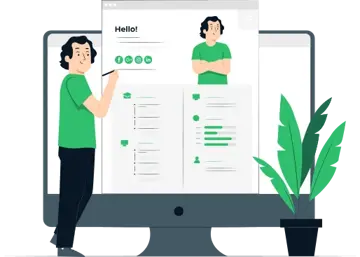
Build your Resume in 15 minutes
Create an awesome resume that meets the expectations of potential employers with our selection of professional, field-tested resume templates.

